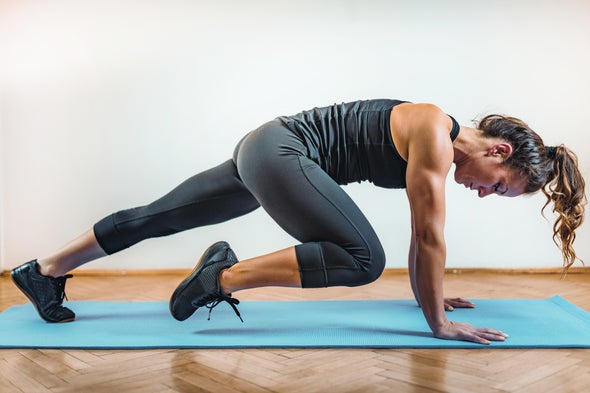Patients with polycystic ovarian syndrome already understand the physical and emotional stress it can cause them. Weight gain is one of the most prominent symptoms of this hormonal disorder.
In addition to weight gain, PCOS affects your body in several other ways. Having an increased amount of testosterone can significantly alter your menstrual cycle, causing some major changes. Additionally, you may also develop acne or darkened patches on your skin. You may also become insulin resistant.
The effects of PCOS on your body
- Excess testosterone – we all produce some testosterone, but excessive amounts can change your menstrual cycle and prevent ovulation
- Insulin resistance – your body produces more insulin than is required to keep your blood sugar levels stable. Increased testosterone can also lead to insulin resistance.
- Fertility reduction
- Absences or irregular periods
- Having an excess of body and facial hair (hirsutism)
- Having fewer hairs on your head (alopecia)
- The presence of acne or darkened skin patches on your skin
From all these physical changes caused by the diagnosis, you may also experience low self-esteem and poor body image, or deal with depression and anxiety.
However, there is good news! Several of these conditions can be ameliorated by making small adjustments to your lifestyle, especially through exercise. Find out which exercises are most beneficial here.
Exercise: How Much Is Enough?
As part of government recommendations, Americans are advised to do moderate or vigorous aerobic activity for 150 minutes per week, in addition to strength training on two days each week for weight loss. Guidelines for PCOS management confirm these recommendations.
As a general rule, strive to exercise 30 minutes a day. If all of this seems too much, relax. Two 15-minute periods of physical activity are the same as one 30 minute period.
For three 10-minute intervals, the same is true. Ensure that your heart rate is maintained between 60% and 75% of your maximum rate.
Types of Exercises for PCOS
A nutritious diet and regular exercise can help manage PCOS, which affects 18 percent of women. Here are some PCOS workouts you should do. Ready?
Cardio
Moderate exercise like jogging, cycling, swimming, or brisk walking can help to alleviate symptoms of PCOS. As a result, your body is better able to react to insulin, and heart disease and type 2 diabetes risk are reduced. Make sure you exercise every day for at least 30 minutes. It will definitely make a difference to your health and weight.
Aerobic Exercise
Cardiovascular exercises provide an aerobic workout. Athletes often refer to aerobic exercise as cardiovascular exercise. Even though the words originated from different places, they have essentially the same meaning and benefit. By increasing your heart rate and breathing you become more fit. There are many types of aerobic exercises that can help with PCOS, including jogging, brisk walking, cycling, and using the elliptical trainer.

Strength Training
Lifting weights reduces fat tissue while increasing bone density and muscle mass. Strength training helps you maintain a healthy weight because your body burns more calories after your workout. By having a higher muscle-to-fat ratio, your body is better able to regulate insulin. The purpose of this type of exercise is to force your muscles to work harder than usual by using weights, resistance bands, or your body weight. These types of exercises can help with PCOS.

HIIT (High-Intensity Interval Training)
When the scales won’t budge, some are tempted to workout harder, thus they are tempted to gain weight with PCOS. The benefits of HIIT in women with PCOS outweigh the loss of weight. Be careful, though. Be aware of how you feel while you work out. Avoid pushing yourself too far, causing yourself pain, stress, or injury. An intense workout may not be suitable for you if it takes you days to recover.

Exercise for the mind and body
Several physical activities such as yoga, tai chi, Pilates, and qi gong promote better balance, strength, and flexibility. Stress-induced anxiety and depression are more likely to develop in women with PCOS because their bodies respond more violently to stress. A mind-body exercise session burns calories improve muscle strength and tone and reduce stress levels that worsen PCOS.
Those with PCOS who practice yoga appear to benefit from lower levels of cholesterol and insulin. Researchers found that yoga is more effective than conventional exercise in improving glucose, insulin, and lipid levels in unintended pregnancies. These types of exercises can also help with PCOS.

The effect of diet on PCOS
Researchers have conducted several studies regarding PCOS and the “best” diet types for those with the condition. These findings led to recommendations for women by the Androgen Excess and PCOS Society, including:
- Reduce your current caloric intake by 500 to 1,000 calories per day if you are overweight.
- Don’t let total fat exceed 30 percent of your daily calories. You should consume less than 10 percent of your calories from saturated fats like high-fat beef, butter, cheese, and full-fat dairy products.
- Choose fiber-rich foods, whole-grain bread and cereals, fruit, and “good” fats like avocados and nuts instead of high-fat foods.
- Limit your cholesterol intake to 200 milligrams a day.
- When possible, avoid trans fats.
- Increase your fiber intake by 5 to 10 grams per day.
Talk to your doctor if you’re not sure where to start when it comes to incorporating these changes into your diet. Alternatively, your doctor may recommend visiting a dietitian to create a diet plan tailored to women with PCOS.
Also Read: Home Remedies to Get Rid of Migraine Headaches Naturally

1 Comment